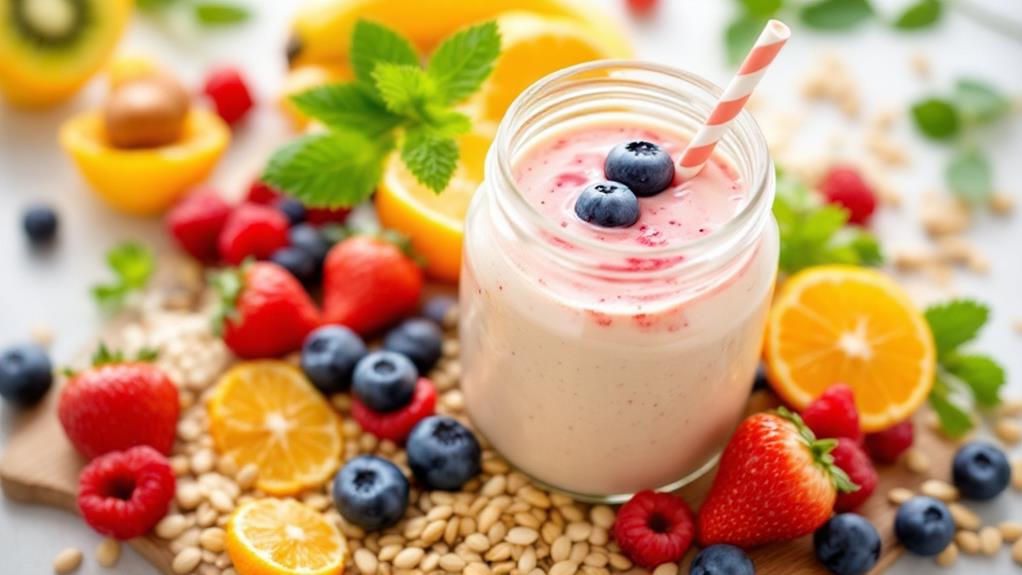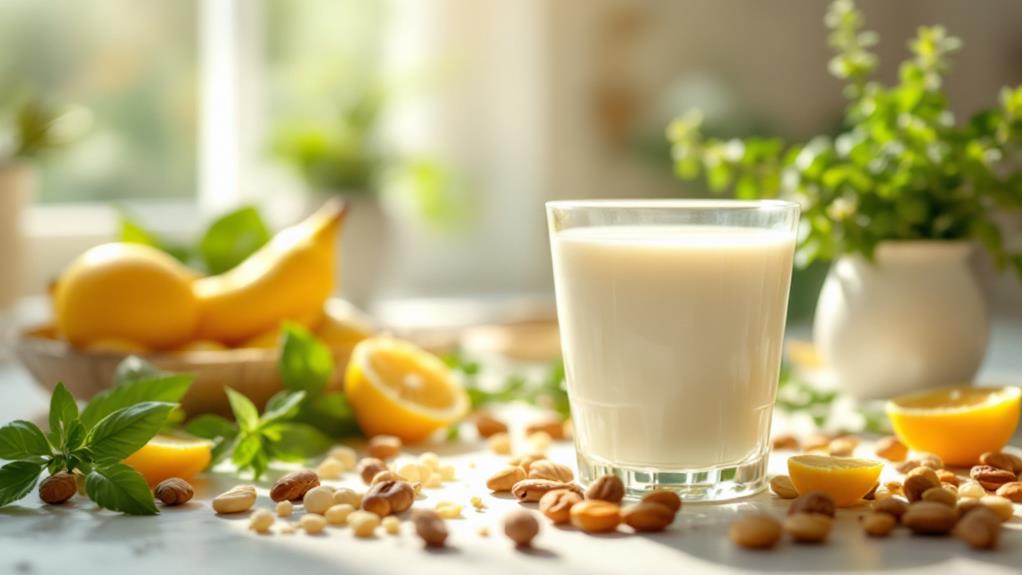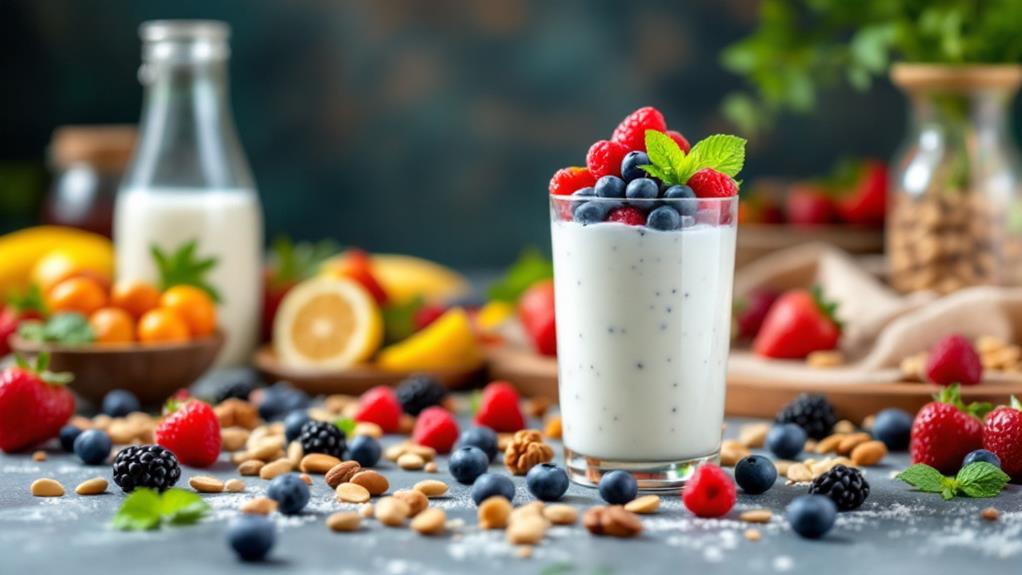An Introduction to Kefir: Benefits and How to Enjoy It

Uncover the wonders of kefir, a probiotic powerhouse brewed from dairy or non-dairy options. Unlike yogurt, kefir boasts around 61 strains of bacteria and yeast, offering superior gut health benefits. It's loaded with calcium, vitamin B12, and probiotics that support digestion, improve your immune system, and even bolster bone strength. For the lactose intolerant, kefir is a friendly choice due to its low lactose content. Enjoy it as a smoothie base, in your cereal, or as a creamy salad dressing. Starting with half a cup daily is ideal. There's much more to reveal about this transformative drink.
Understanding Kefir
Regarding understanding kefir, it's essential to recognize that this fermented milk drink isn't just a trendy beverage; it has deep roots in the Caucasus region's history. Originating from this area, kefir boasts a unique combination of beneficial bacteria and yeast, granting it significant health promoting characteristics. It's a powerhouse of probiotics, with approximately 61 strains of these beneficial bacteria and yeasts, which are renowned for supporting gut health and improving digestion.
Kefir can be made from different types of milk, including cow, goat, and sheep milk, along with non-dairy alternatives like coconut and almond milk, catering to distinct dietary needs. This versatility makes it accessible to many, including those who are lactose intolerant. The fermentation process reduces lactose content, allowing you to enjoy its rich taste and health benefits without discomfort.
For ideal health benefits of kefir, consider making it a daily supplement to your diet. Drinking kefir every day can help balance your gut flora, thanks to its probiotic content. Its tangy flavor and effervescent quality make it a revitalizing choice, either plain or flavored, enhancing your complete well-being.
Nutritional Value
Kefir's nutritional profile makes it a standout choice for those seeking a nutrient-dense beverage. With just one cup of low-fat kefir, you're consuming about 104 calories, packed with 9 grams of protein and 11.5 grams of carbohydrates. This fermented dairy product is rich in crucial nutrients like calcium and Vitamin B12, providing 24% and 29% of their Daily Values, respectively. These nutrients are crucial for maintaining bone health and supporting energy production.
Kefir is an excellent source of probiotics, boasting up to 61 unique strains, which is far superior to yogurt. This diverse probiotic content contributes greatly to kefir's health benefits, enhancing digestion and general well-being. Another advantage is that kefir is low in lactose, thanks to its fermentation process. This characteristic makes it more accessible for lactose-intolerant individuals who typically struggle with other dairy products.
Moreover, kefir contains about 11 grams of sugar per cup, primarily from lactose, making it a much healthier alternative to many sugary beverages. Its combination of protein, carbohydrates, and beneficial probiotics makes kefir an ideal choice for anyone looking to improve their diet and elevate their health naturally.
Probiotic Benefits

Amid the array of kefir's health benefits, its probiotic content stands out as particularly remarkable. Packed with up to 61 strains of probiotics, including Lactobacillus and Streptococcus, kefir is a powerhouse for promoting gut health. This fermented drink offers a unique way to restore balance in your gut bacteria, essential for a healthy microbiome. By consuming probiotics in kefir, you can improve digestive health, experiencing fewer symptoms of conditions like IBS and enhancing nutrient absorption.
For those with lactose intolerance, kefir provides a delightful solution. The fermentation process reduces lactose content, making this drink easier to digest while still delivering the beneficial effects of probiotics. Regularly incorporating kefir into your diet can support gut health and offer a more effective remedy for diarrhea compared to many other fermented foods.
Beyond digestion, the probiotics in kefir can enhance your immune system. These microorganisms combat harmful bacteria, improving your body's immune response. By integrating kefir into your routine, you're not just enjoying a delicious beverage—you're actively supporting your comprehensive well-being. With its diverse probiotic content, kefir is a simple yet powerful way to nurture both your gut and immunity.
Bone Health Support
In regard to supporting bone health, kefir stands out as a nutritional powerhouse. Packed with calcium and vitamin K2, kefir plays an essential role in maintaining strong bones and warding off osteoporosis. Regularly consuming kefir can improve calcium absorption, helping you achieve better bone density. This is particularly beneficial for postmenopausal women, who often face an increased risk of osteoporosis.
The probiotics in kefir do more than just support your gut; they also aid in mineral absorption, which is important for maintaining bone integrity. By improving how your body absorbs significant minerals, kefir helps guarantee your bones receive the nutrients they need to remain strong and healthy.
Kefir's rich nutrient profile includes magnesium and phosphorus, working in harmony with calcium to strengthen overall bone strength and reduce fracture risk. Together, these nutrients create a synergistic effect, improving your bone health. Regardless of whether you're looking to slow the progression of osteoporosis or simply maintain robust bones, incorporating kefir into your diet is a smart move. With its diverse range of benefits, kefir offers a tasty and effective way to support your bone health naturally.
Immune System Boost

Enhancing your immune system is one of the standout benefits of kefir. Packed with probiotics, this fermented drink is a powerhouse for your health. The special strain, Lactobacillus kefiri, found in kefir, plays a vital role in improving your immune response. It helps inhibit harmful bacteria like Salmonella and E. coli, reducing your risk of infections. Regularly consuming kefir can greatly enhance your health by supporting your immune system, thanks to its rich probiotic content.
Kefir is more than just probiotics; it's also rich in fundamental nutrients like vitamin D and K2. These nutrients contribute to a healthier immune system by regulating inflammation and supporting comprehensive immune function. The bioactive compounds in kefir help modulate your immune system, potentially decreasing allergy symptoms and inflammation markers.
Cancer-Fighting Potential
While kefir strengthens your immune system with its rich probiotic content, it also holds promise in the domain of cancer prevention. The probiotics in kefir may stimulate your immune system, improving your body's ability to fight tumors and potentially reducing cancer cell growth. Significantly, test-tube studies reveal that kefir extract can inhibit breast cancer cell growth by up to 56%. This suggests kefir could serve as an adjunctive treatment in cancer therapy.
The fermentation process of kefir produces bioactive compounds with antioxidant properties. These compounds help protect against oxidative stress, a known contributor to cancer development. Regular consumption of kefir might reduce the risk of certain cancers, though more extensive human studies are needed to confirm these findings.
Additionally, kefir's unique microbial composition plays an essential role in modulating gut health. Your gut health is increasingly recognized as fundamental for cancer prevention and general health. By maintaining a balanced gut environment, kefir could indirectly contribute to lowering cancer risks. Incorporating kefir into your diet offers a delicious way to potentially improve your body's defenses against cancer, supporting your general health path.
Allergy and Asthma Relief

Kefir, with its rich probiotic content, might just be your ally in combating allergies and asthma. The probiotics in kefir, particularly Lactobacillus kefiri, are known to help reduce inflammation linked with allergies. This reduction can potentially ease symptoms like sneezing and nasal congestion, offering you a refreshing change. Animal studies have shown that kefir can suppress allergy-related inflammation, pointing to its role in alleviating allergic reactions. By regularly consuming kefir, you might experience a decrease in inflammatory markers, which is especially beneficial for those with asthma, as it can lead to reduced airway inflammation and improved respiratory health.
Here are three ways kefir might help you:
- Immune Response Improvement: The unique probiotics in kefir may elevate your immune system, providing protection against respiratory infections and allergy triggers.
- Anti-inflammatory Effects: Kefir's anti-inflammatory properties can help calm down inflammation, a major factor in asthma and allergy symptoms.
- Dairy Benefits: As a dairy product, kefir offers supplementary nutrients like calcium and vitamin D, further supporting your complete health.
While more human studies are needed, the initial findings are promising, making kefir a potential supplement to your health regimen.
Cardiovascular Benefits
Regarding heart health, kefir offers several impressive benefits. When you incorporate kefir into your diet, you might notice a positive impact on your cholesterol levels. The probiotics in kefir are particularly effective in reducing LDL cholesterol, a key factor in heart disease risk. Furthermore, these probiotics can help regulate your blood pressure, providing antihypertensive effects that support comprehensive cardiovascular wellness.
Kefir also contributes to improved heart health markers by reducing triglycerides and inflammation. This reduction is significant because high triglyceride levels and inflammation are linked to an increased risk of cardiovascular disease. The bioactive peptides present in kefir further improve your body's ability to manage stress and lower cardiovascular risk through their antihypertensive properties.
Moreover, regular consumption of kefir might lower your risk of metabolic syndrome, a condition associated with a higher likelihood of developing cardiovascular disease. By addressing these numerous factors, kefir serves as a multi-faceted ally in promoting heart health. So, if you're looking for a natural way to support your heart, consider making kefir a staple in your balanced diet. Your heart will likely thank you for it!
Enjoying Kefir

Imagine this: a creamy, tangy beverage that's as versatile as it is nutritious. Kefir is something you can really enjoy in a variety of ways. It's more than just a drink; it's a powerhouse of probiotics and nutritional benefits that can be seamlessly integrated into your diet. Here's how:
- Breakfast Transformation: Swap your regular milk for kefir in your oatmeal or cereal. This simple change adds a creamy texture and elevates your morning meal with probiotics, aiding your digestive health right from the start.
- Invigorating Smoothies: Blend kefir with your favorite fruits to create a nutritious and delicious smoothie. The tangy flavor pairs perfectly with berries, bananas, or mangoes, delivering a revitalizing drink that's as tasty as it is healthy.
- Creative Salad Dressings: Use kefir as a base for salad dressings. Its tanginess amplifies the flavor of your greens without altering the consistency, while also providing added nutritional benefits.
For a fun treat, try making kefir popsicles by blending it with fruits and freezing the mix. Start with small amounts, like ½ cup daily, to let your body adjust and enjoy all its digestive perks.




